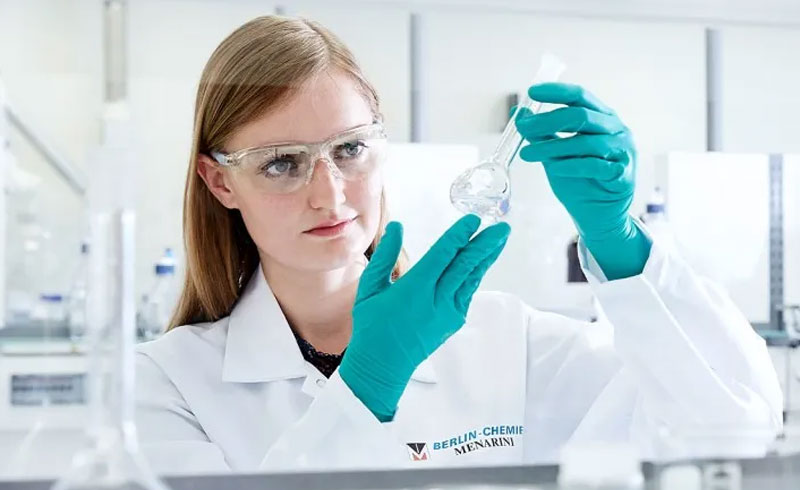that Demonstrate Elacestrant’s PFS Increases with Duration of Prior CDK4/6i in ER+, HER2- in Metastatic Setting

- Elacestrant demonstrated longer progression-free survival (PFS) vs SOC endocrine therapy with medians up to 8.6 months, positively associated with the duration of prior treatment with CDK4/6 inhibitors
- Elacestrant side effects were manageable and consistent with previously reported results
- Results demonstrate that elacestrant may have the potential to become a new standard of care as a monotherapy endocrine sequencing option in ER+, HER2- advanced or metastatic breast cancer after progression on CDK4/6i
FLORENCE, Italy, November 30th, 2022 - The Menarini Group (“Menarini”), a privately held Italian pharmaceutical and diagnostics company, and Stemline Therapeutics (“Stemline”), a wholly-owned subsidiary of the Menarini Group, will present additional data from the Phase 3 EMERALD study (NCT03778931) of elacestrant, an investigational oral SERD, during the upcoming San Antonio Breast Cancer Symposium (SABCS) being held from December 6-10.
EMERALD is a Phase 3 registrational trial that demonstrated statistically significant progression-free survival (PFS) with elacestrant vs SOC endocrine monotherapy (fulvestrant, letrozole, anastrozole, exemestane), meeting both primary endpoints in all patients and in those patients harbouring ESR1 mutations (ESR1-mut), following progression on prior CDK4/6 inhibitors (CDK4/6i) in ER+, HER2- advanced or metastatic breast cancer.
A post-hoc analysis of the PFS results in the EMERALD trial based on the duration of prior CDK4/6i usage shows clinically meaningful results which favor monotherapy elacestrant, both in the total patient population as well as in patients with ESR1-mut. Increased duration of prior CDK4/6i in metastatic patients was positively associated with longer PFS on elacestrant but not with SOC.
For those who were exposed to CDK4/6i ≥12 months prior to randomization on EMERALD, elacestrant achieved:
- In the all-patient population, a mPFS of 3.8 months on elacestrant vs 1.9 months on SOC, a 39% reduction in the risk of progression or death (HR=0.61 95% CI: 0.45-0.83)
- In the ESR1-mut population, a mPFS of 8.6 months on elacestrant vs 1.9 months on SOC, a 59% reduction in the risk of progression or death (HR=0.41 95% CI: 0.26-0.63)
For those who were exposed with CDK4/6i ≥18 months prior to randomization on EMERALD, elacestrant achieved:
- In the all-patient population, a mPFS of 5.5 months on elacestrant vs 3.3 months with SOC, a 30% reduction in the risk of progression or death (HR=0.70 95% CI: 0.48-1.02)
- In the ESR1-mut population, a mPFS of 8.6 months on elacestrant vs 2.1 months on SOC, a 53% reduction in the risk of progression or death (HR=0.47 CI: 0.20-0.79).
Updated safety data were consistent with previously reported results. Most of the adverse events (AEs), including nausea, were grade 1 and 2, and only 3.4% and 0.9% of the patients discontinued trial therapy because of an AE on elacestrant and SOC, respectively. A low percentage of patients received an antiemetic; 8.0% on elacestrant, 3.7% on fulvestrant, and 10.3% on AI, respectively. No hematological safety signal was observed and none of the patients in either of the two treatment arms had sinus bradycardia.
Virginia Kaklamani, MD, DSc, breast medical oncologist and professor of medicine, UT Health San Antonio, MD Anderson Cancer Center, commented, “These results show that when used as a single agent, elacestrant provided mPFS up to 8.6 months, based on the duration of previous CDK4/6 inhibitor therapy, with a manageable safety profile and the convenience of an oral tablet. This suggests elacestrant may have the potential to become a new standard of care as a monotherapy endocrine sequencing option in ER+, HER2- advanced breast cancer after progression on CDK4/6i, before moving to combination therapies.”
“These results further highlight elacestrant’s potential to change the treatment paradigm of ER+, HER2- advanced or metastatic breast cancer. Elacestrant is under Priority Review with the U.S. Food and Drug Administration (FDA) with a target PDUFA date of February 17, 2023,” commented Elcin Barker Ergun, Chief Executive Officer of the Menarini Group.
A complete list of key Menarini Group presentations at SABCS is below.
|
Lead Author Name
|
Abstract Number and Title
|
Presentation Details
|
|
V. Kaklamani
|
GS3-01. EMERALD Phase 3 trial of elacestrant versus standard of care endocrine therapy in patients with ER+, HER2- metastatic breast cancer: Updated results by duration of prior CDK4/6i in metastatic setting
|
December 8, 2022
8:30-8:45 AM CT
Oral Presentation
General Session 3
Hall 3
|
|
H. Rugo
|
OT2-01-03. ELEVATE: A Phase 1b/2, open-label, umbrella study evaluating elacestrant in various combinations in women and men with metastatic breast cancer (mBC)
|
December 7, 2022
5:00-6:30 PM CT
Ongoing Trials Poster Session 2
Hall 1
|
|
M. Piccart
|
PD18-05. MEN1611, a PI3K Inhibitor, combined with trastuzumab (T) ± fulvestrant (F) for HER2+/PIK3CA mutant (mut) advanced or metastatic (a/m) breast cancer (BC): updated safety and efficacy results from the ongoing Phase 1b study (B-PRECISE-01)
|
December 9, 2022
7:00-8:15 AM CT
Spotlight Poster Discussion 18
Stars at Night Ballroom - Hall 3&4
|
The Menarini Group obtained global licensing rights for elacestrant in July 2020 from Radius Health, Inc., who conducted and successfully completed the EMERALD study. The Menarini Group is now fully responsible for global registration, commercialization, and further development activities for elacestrant.
About Elacestrant (RAD1901) and the EMERALD Phase 3 Study
Elacestrant is an investigational selective estrogen receptor degrader (SERD). In 2018, elacestrant received Fast Track designation from the FDA. Preclinical studies completed prior to EMERALD indicate that the compound has the potential for use as a single agent or in combination with other therapies for the treatment of breast cancer. The EMERALD Phase 3 trial is a randomized, open label, active-controlled study evaluating elacestrant as second- or third-line monotherapy in ER+, HER2- advanced/metastatic breast cancer patients. The study enrolled 478 patients who had received prior treatment with one or two lines of endocrine therapy, including a CDK 4/6 inhibitor. Patients in the study were randomized to receive either elacestrant or the investigator’s choice of an approved hormonal agent. The primary endpoints of the study were progression-free survival (PFS) in the overall patient population and in patients with estrogen receptor 1 gene (ESR1) mutations. Secondary endpoints included evaluation of overall survival (OS), objective response rate (ORR), and duration of response (DOR) and safety.
About The Menarini Group
The Menarini Group is a leading international pharmaceutical and diagnostics company, with a turnover of over $4 billion and over 17,000 employees. Menarini is focused on therapeutic areas with high unmet needs with products for cardiology, oncology, pneumology, gastroenterology, infectious diseases, diabetology, inflammation, and analgesia. With 18 production sites and 9 Research and Development centers, Menarini’s products are available in 140 countries worldwide. For further information, please visit www.menarini.com.
About Stemline
Stemline Therapeutics, a wholly owned subsidiary of The Menarini Group, is a commercial-stage biopharmaceutical company focused on the development and commercialization of novel oncology therapeutics. Stemline commercializes a novel targeted treatment directed to CD123 for patients with blastic plasmacytoid dendritic cell neoplasm (BPDCN) in the United States and Europe which is also being evaluated as monotherapy and in combination with other agents, in additional clinical trials for a variety of other indications. Stemline has an extensive clinical pipeline of small molecules and biologics in various stages of development for a host of solid and hematologic cancers.
About Radius
Radius is a global biopharmaceutical company focused on addressing unmet medical needs in the areas of bone health and oncology. Radius’ lead product, TYMLOS® (abaloparatide) injection, was approved by the U.S. Food and Drug Administration for the treatment of postmenopausal women with osteoporosis at high risk for fracture. The Radius clinical pipeline includes investigational abaloparatide injection for potential use in the treatment of men with osteoporosis and the investigational drug, elacestrant (RAD1901), for potential use in the treatment of hormone-receptor positive breast cancer out-licensed to Menarini Group.
Media Relations:
|
The Menarini Group
Valeria Speroni Cardi
Email: pressoffice@menarini.com
|
U.S. Media
Nick Hennen
LaVoieHealthScience
Phone: +1 (929) 462-9479
Email: nhennen@lavoiehealthscience.com
|


















